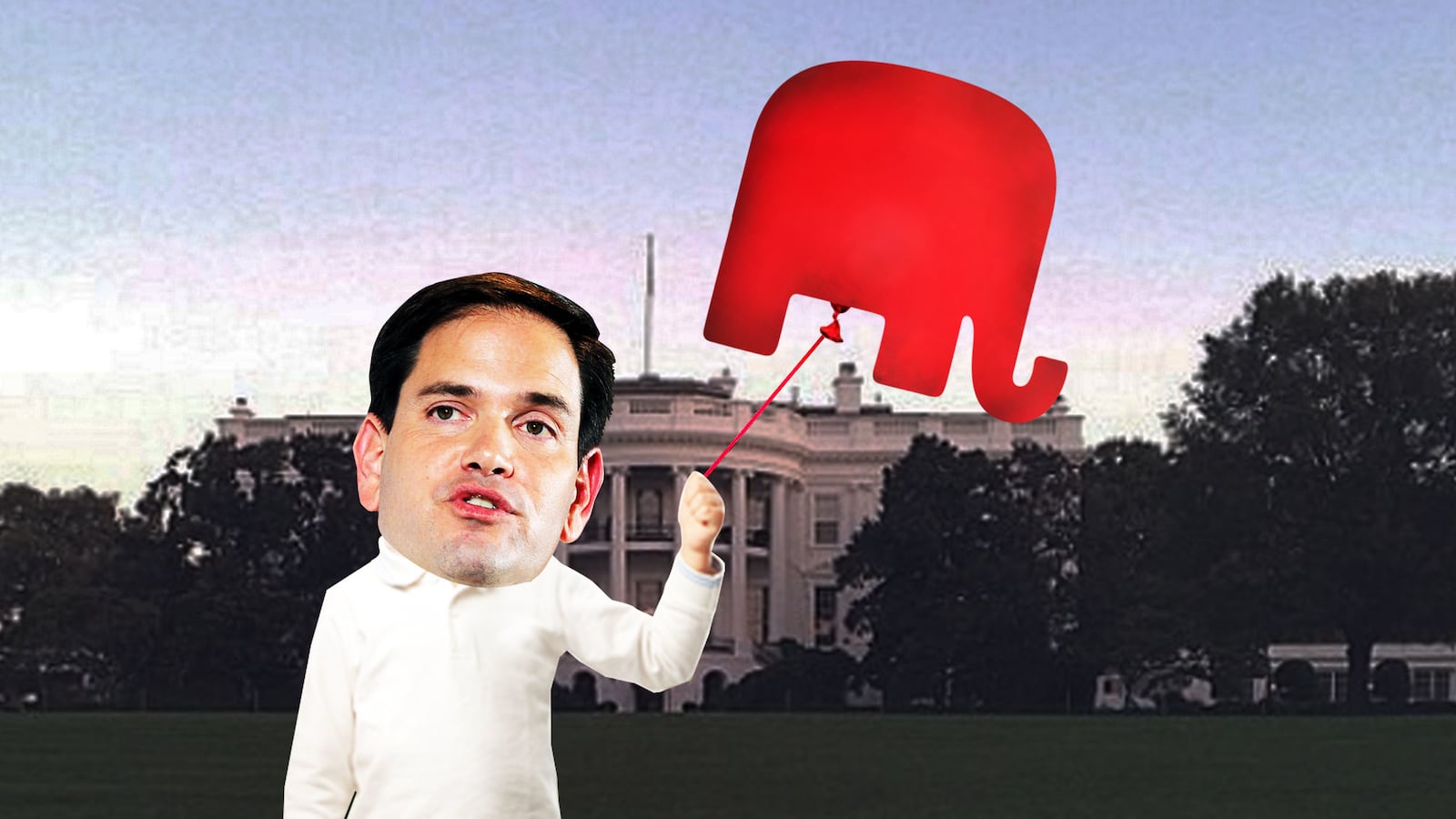He's 44. He looks like a kid. Should presidents in this day and age be older and more experienced?
This is a question that will be asked more and more as Marco Rubio remains the favorite of the betting markets and the political cognoscenti who believe he will eventually emerge as the Republican nominee to take on Hillary Clinton.
In truth, he’s not all that young by modern standards. Ted Cruz is also 44, for example. President Obama was 47 when he won. But Rubio has a more youthful look than either of them, and perception is reality.
There is, of course, a threshold of age and experience that candidates must surpass—both constitutionally and aesthetically. But Rubio easily clears both hurdles. Having been Speaker of the Florida House, as well as serving a term in the U.S. Senate, it’s hard to argue that he lacks experience—especially in a race against candidates like Donald Trump, Ben Carson, and Carly Fiorina. Also, keep in mind that Obama had less by way of formal qualifications before becoming president).
Besides, when was the last time age and experience defeated youth and energy? “Don’t stop thinking about tomorrow.” “Change you can believe in.” If age and experience were trump cards, Hillary Clinton would have defeated Barack Obama—and Bush 41 would have beaten an Arkansas governor named Bill Clinton. So not only are youth and energy not a disadvantage for Rubio, but he is perhaps perfectly positioned to run against Hillary Clinton. Remember when he announced his candidacy the day after Hillary announced hers?
“Just yesterday, we heard from a leader from yesterday who wants to take us back to yesterday, but I feel that this country has always been about tomorrow,” he said.
(The ability to make this argument is a huge rationale for Rubio’s candidacy. Jeb Bush, scion of the Bush dynasty and Rubio’s erstwhile friend-turned-rival, could never run on representing generational change.)
The only times I can find where youth has been an impediment have to do with running mates like Dan Quayle and Sarah Palin. Both candidates were effectively air-dropped into the middle of a national presidential campaign. They hadn’t endured the slings and arrows of running for president—the numerous debates and high-profile Sunday morning TV interviews. And they didn’t have the luxury of having their gaffes and mini-scandals trickle out over the course of years.
Conversely, Rubio ran a high-profile U.S. Senate campaign against the sitting governor of Florida, Charlie Crist—and managed to overcome the attacks and “oppo” leaks that one can expect from such a race. He then went on to serve in the U.S. Senate, where he would frequently appear on national TV shows and even champion some landmark, if controversial, legislation (unlike, say, Barack Obama or Hillary Clinton).
There are other reasons why I’m bullish about Rubio. It’s historically difficult for a political party to win three consecutive elections, but as conservative radio host Hugh Hewitt told CNN recently, this matchup would essentially be asking Americans to go “backwards to the future, not forward to the future with a young, dynamic Republican.”
I’m imagining campaign ads showing Rubio and his former Miami Dolphins cheerleader wife, walking hand-in-hand on a beach, with their little children. Now juxtapose that with Hillary and Bill. The contrast would be stark.
We can, of course, argue about whether our cultural preference for youthful energy and the decline of respect for our elders (our acceptance of “line cutting” over “dues paying”) are good or bad, but it’s hard to argue that it’s not a settled trend. Even in the Republican primary, it is very clear that the conservative base has little interest in hearing elected officials drone on about how much they accomplished as governor. This is true even when what they accomplished amounts to conservative points on the board. We are aspiration- and future-oriented. We live in a “What have you done for us lately?” world.
Of course, liberals will argue that, although Rubio is young, his ideas are hidebound. This would work on a lesser candidate, but don’t expect Rubio to tolerate it. First, this argument requires a sort of Marxist assumption that history only moves in one direction, and that “progress” is defined as becoming more liberal.
Second, the truth—and we saw this when Hillary Clinton attacked the sharing economy—is that, in many ways, liberalism is more at home with a top-down industrial-revolution, assembly-line model of government. As I’ve said many times before, the guy who uses Uber and manages his stock portfolio on a smart phone shouldn’t be in the party of bureaucratic regulations and the nanny state. Rubio is better suited than any of his Republican competitors to make this argument.
It’s true that, in politics, almost every attribute is a double-edged sword. But given the choice, I’d bank on being the candidate of youthful energy every day, and twice on Sunday. And I doubt I’m alone on that score. In modern America, being too young is almost, but not quite, tantamount to being too good looking.
Matt Lewis is author of the forthcoming book Too Dumb to Fail: How the GOP Betrayed the Reagan Revolution to Win Elections (and How It Can Reclaim Its Conservative Roots), which will be released on Jan. 26, 2016.






